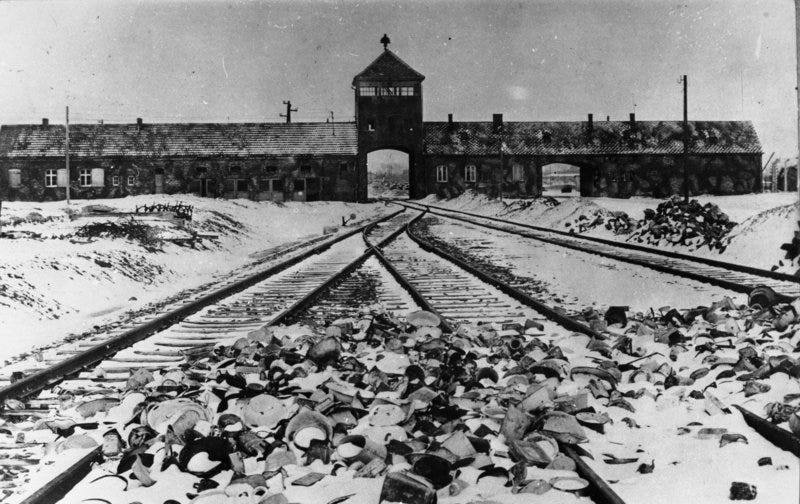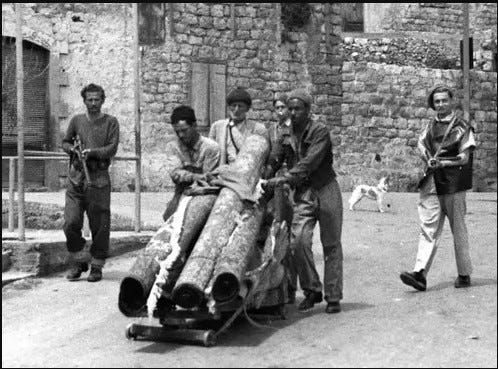Exploring Defamation (2009)
In-depth exploration of how anti-Semitism and Holocaust memory shape Israeli society
After writing about the documentary Israelism, someone recommended I watch Yoav Shamir's Defamation (2009) as a good introduction to the themes in the film. I ended up watching it this weekend, just after completing my article on Zionist ideology. It wasn't really planned that way, but it feels like a natural progression. It gave me more context and depth to the ideas I had been discussing. While Israelism focuses on how young American Jews become strong supporters of Israel, Defamation looks at how anti-Semitism is perceived and used, particularly within Israel.
The film begins with a heartfelt conversation between Shamir and his grandmother. She reflects on the early Jewish migration to Palestine, saying, “We didn’t come to take anything from the country or its people.” Her words illustrate a deep sense of idealism I will not question but also show a tragic gap between her idealism and the reality. This moment sets the tone for a documentary that blends personal reflection with political exploration.
Changing Style
Before we delve into what the film shows, a few words about style. When comparing Defamation to Shamir’s earlier documentary Checkpoint (2003) which I also reviewed, it’s clear there’s a difference in style. In Checkpoint, Shamir stays behind the camera, allowing the footage of Palestinian civilians passing through Israeli checkpoints to speak for itself. The lack of narration leaves the raw footage open to interpretation, creating a powerful and unfiltered view of the situation.
In Defamation, Shamir takes a more active approach. He interviews people, shares his opinions, and asks questions, making the film feel more personal and subjective. This first-person style adds a layer of intimacy, reflecting Shamir’s own journey as much as the broader themes he’s exploring. Watching the movie, my own reflections melt together with Shamir’s, because is he suggesting something, or am I reading that into something much more neutral?
Holocaust Education
One of the most striking elements of the film is its look at how Holocaust education in Israel has evolved over time. Shamir recalls that in the 1980s when he was a teenager, fewer than 500 students visited Holocaust sites like Auschwitz each year. Today (2009, I could not find later numbers), more than 30,000 teenagers make the pilgrimage annually, many of them just months before joining the military.
These trips are charged with emotion and emphasize a survivalist mentality: “The world hates us, and we must protect ourselves.” While these visits are vital for remembering history, they also foster fear and a sense of isolation. Its not that I think learning about this is not important, but the way certainly can be questioned. Watching these scenes made me reflect on the many disturbing videos I’ve seen of Israeli soldiers committing violence or israeli civilians celebrating attacks against Palestinians. How much of this behavior is shaped by the kind of education these students receive? One of the young students actually bring it up, this makes the threshold higher to empathise with others. She talks about how seeing palestinian homes buldozed she really does not care, as “worse was done to us” and “arabs have many houses”.
While there has been much focus on how Palestinian children are taught to hate Israelis or Jews, Defamation challenges us to consider what’s happening on the Israeli side. It’s crucial to understand these dynamics, especially considering Israel’s significant support from the West. One scene shows the group of Israeli girls on a Holocaust trip interacting with elderly Polish men. The girls are led to believe the men are verbally attacking them and Israel, but the men are simply asking if they are from Israel, according to the translation provided by Shamir. This moment speaks volumes about how narratives are shaped and manipulated.
Complexities
In the Brooklyn neighborhood of Crown Heights, where tensions between blacks and Jews erupted into a violent riot in 1991, Shamir finds Jewish residents fearing for their safety on one side and black residents on the other, recommending a thorough read of the anti-Semitic Protocols of the Elders of Zion.
However, Shamir also meets an Orthodox rabbi who points out that when a black person robs a Jew, it is not always an act of anti-Semitism. The rabbi goes further, saying that the hypervigilance og groups like the Anti-Defamation League (ADL), only exacerbates the already tense relationship between Jews and blacks in the area.
The Weaponization of Anti-Semitism
At the core of Defamation is its exploration of anti-Semitism and its use as a political tool. Shamir critically examines groups like the ADL, questioning whether their efforts genuinely combat prejudice or whether they actually just shield Israeli policies from valid criticism. Another important point in the movie is the role of the Israel Lobby and the conflation between anti-Semitism and anti-Zionism.
Because we have to acknowledge that anti-Semitism is a real and growing problem in many parts of the world, however, as Shamir highlights, the distinction between actual hatred and the use of anti-Semitism as a political weapon is important to understand also, and the dynamics between them.
In an interesting moment, Shamir meets with Abraham Foxman, the head of the ADL, also featured in Israelism. Foxman explains that the ADL’s role often involves playing on the perception of Jewish power to fight anti-Semitism—ironically, a perception rooted in conspiracy theories about Jewish power. Shamir lets the question about whether this strategy ends up reinforcing those very conspiracy theories hang in the air.
Avnery and Other Critical Voices
Shamir also meets Uri Avnery, a former Israeli Knesset member and one of the most prominent peace activists in Israel. The now-deceased Avnery had a long history of challenging Israeli policies. A former member of the Irgun terror group during his youth, he participated in the 1948 Arab-Israeli war. He later became an outspoken critic of Israel’s treatment of Palestinians.
Avnery was also the editor of the anti-establishment newspaper Haolam Hazeh and wrote many critical pieces, which earned him both admiration and controversy. In his later years, he critiqued Israel’s new nationality law, describing it as semi-fascist. He passed away in 2018, but his voice remains influential in the Israeli peace movement.
We also meet Norman Finkelstein, a well-known Jewish critic of Israeli policies,in Defamation. He argues that the Holocaust is often used as a weapon to silence any criticism of Israel’s treatment of Palestinians. According to Finkelstein, this manipulation of Holocaust memory helps deflect attention from the suffering of Palestinians and prevents meaningful dialogue about the situation in the region. John Mearsheimer and Stephen Walt, authors of The Israel Lobby, also make an appearance.
Another important figure mentioned in the film is David Hirsch, a scholar who has focused on the Palestine issue. Hirsch’s work highlights how many Israelis view the Palestinian cause as a threat to their national identity. The portrayal of Palestinians as a "non-nation" has been used to justify Israel’s policies toward them.
Final Thoughts
Shamir’s documentary sheds light on the complexities of these issues, urging viewers to critically examine the ways in which anti-Semitism, Holocaust memory, and Israeli policies are intertwined and used to shape public opinion both within Israel and internationally. Absolutely a movie to watch, even more so now to understand Israeli behavior post the attacks by Hamas 7.10 2023.
All articles on Diaspora Dialogue are free to read for one year from publication. If you’ve enjoyed this piece and would like to support my work, you can do so by subscribing, or by buying me a coffee. Thank you for reading and being part of the dialogue!




